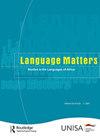Students’ Voices on How Indigenous Languages Are Disfavoured in South African Higher Education
IF 0.8
3区 文学
0 LANGUAGE & LINGUISTICS
引用次数: 4
Abstract
Abstract South Africa is a country with 11 official languages. However, teaching and learning in South African universities continue to be dominated by a language that was imposed by colonialism. Drawing on a broader doctoral study which explores students’ experiences of (de)coloniality in post-apartheid education, this article reports on how access to education is hindered by the absence of indigenous languages as languages of learning and teaching. This article is based on data that was collected through in-depth individual interviews with 10 social work graduates. In a setting dominated by English, graduates spoke of their hardships in accessing education. Framed within the Afrocentric paradigm and anti-colonial theory, the article calls for the advancement of African indigenous languages in South African universities as part of the transformation agenda. The article draws attention to a need for the university community to commit to the formulation and implementation of language policies that promote translanguaging.南非高等教育如何排斥原住民语言,学生发声
摘要南非是一个拥有11种官方语言的国家。然而,南非大学的教学仍然受到殖民主义强加的语言的支配。这篇文章借鉴了一项更广泛的博士研究,该研究探讨了学生在后种族隔离教育中的(去)殖民经历,报道了由于缺乏土著语言作为学习和教学语言,受教育的机会是如何受到阻碍的。本文基于对10名社会工作专业毕业生的深入个人访谈收集的数据。在一个以英语为主的环境中,毕业生们讲述了他们在接受教育方面的困难。在以非洲为中心的范式和反殖民理论的框架下,这篇文章呼吁将在南非大学中发展非洲土著语言作为转型议程的一部分。这篇文章提请注意,大学界需要致力于制定和实施促进跨语言的语言政策。
本文章由计算机程序翻译,如有差异,请以英文原文为准。
求助全文
约1分钟内获得全文
求助全文
来源期刊

Language Matters
Multiple-
CiteScore
1.20
自引率
0.00%
发文量
19
期刊介绍:
The purpose of Language Matters is to provide a journal of international standing with a unique African flavour focusing on multilingualism in Africa. Although the journal contributes to the language debate on all African languages, sub-Saharan Africa and issues related to multilingualism in the southern African context are the journal’s specific domains. The journal seeks to promote the dissemination of ideas, points of view, teaching strategies and research on different aspects of African languages, providing a forum for discussion on the whole spectrum of language usage and debate in Africa. The journal endorses a multidisciplinary approach to the study of language and welcomes contributions not only from sociolinguists, psycholinguists and the like, but also from educationalists, language practitioners, computer analysts, engineers or scholars with a genuine interest in and contribution to the study of language. All contributions are critically reviewed by at least two referees. Although the general focus remains on multilingualism and related issues, one of the three issues of Language Matters published each year is a special thematic edition on Language Politics in Africa. These special issues embrace a wide spectrum of language matters of current relevance in Southern Africa.
 求助内容:
求助内容: 应助结果提醒方式:
应助结果提醒方式:


